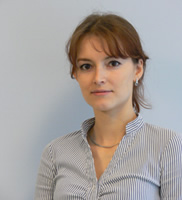TU Delft post-doctoral researcher, Dr. Maria Molodova won the IEEE’s Best Student Paper award for her PhD work on railroad defects detection, and her findings keep producing papers in her new role in Civil Engineering’s Railway Engineering Group.
In the second week of October, the IEEE International Conference on Intelligent Transport Systemswas held in the Netherlands. Every year, the conference names one paper the Best Student Paper. This year’s winner, titled “Detecting Surface Defects Using Wavelets,” outlined an algorithm to spot potential failure points on railroad tracks by manipulating the acceleration signals from the train axle box. By analyzing the wheel acceleration in both frequency and space, Dr. Molodova could infer what part of the track would require maintenance before breakage would occur. She co-authored the paper with Drs. Zili Li, Alfredo Núñez Vicencio and Rolf Dollevoet, all researchers at TU Delft.
Although Molodova felt under the weather during the conference, she decided to present her paper anyway. Not realizing that her paper had been nominated, she rested during the recognition dinner, and group member Núñez Vicencio accepted the award in her place.
“I am really proud of students that do their best to stick out above the average,” said Dr. Rolf Dollevoet, head of Road and Railway Engineering Section, in Civil Engineering’s Structural Engineering department, where Molodova now does post-doctoral research. Dollevoet says that her research is “valuable” for improving quality management and measurement techniques at ProRail, the Utrecht-based public railway quality control company that sponsored the research and where he is a system specialist.
Molodova did her doctoral work in Civil Engineering, finishing in January of this year with a dissertation on detecting squats, defects that arise when the track material becomes fatigued. Molodova has a Master of Science in mechanics in 2005 from the N.I. Lobachevsky State University of Nizhny Novgorod, Russia.
During Moldova’s PhD period, Molodova and Dr. Zili Li, a researcher and instructor in the Railway Engineering group, filed a patent for the method and instrumentation of detecting defects with the axle box acceleration.
“I’ve never worked with a researcher who has had a patent before,” Núñez Vicencio said. He said that researchers like Molodova consistently keep the Railway Engineering Group’s achievement bar high.
Now, Molodova’s main task as a post-doctoral researcher in Dollevoet’s Railway Engineering Groupis to produce papers on findings that she found during her doctoral years, spanning 2006 to 2013. She will work with Li and Dollevoet.



Comments are closed.